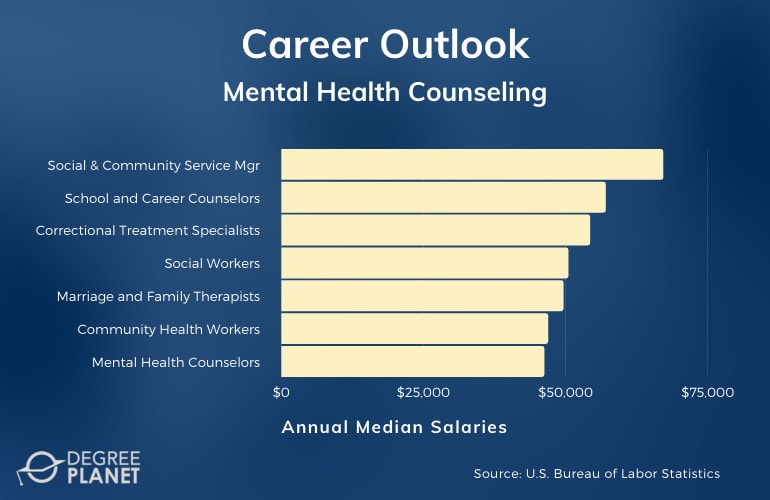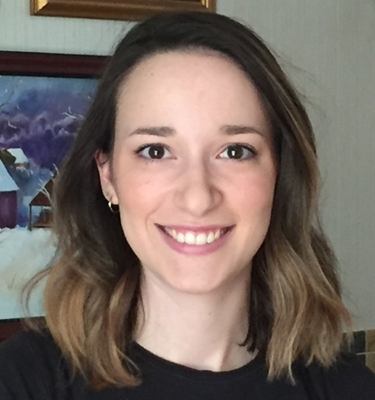Is a masters in mental health counseling worth it? As a counselor, you have to opportunity to help your clients make positive changes in many aspects of their lives, from their career to their relationships.

Editorial Listing ShortCode:
The field of counseling is growing exponentially, and new research continues to drive development in clinical practice.
Is a Masters in Mental Health Counseling Worth It?

Yes, a Masters in Mental Health Counseling is worth it for many professionals. According to the Bureau of Labor Statistics, community and social service jobs are set to grow at 12% over the next 10 years, much faster than the average for all occupations.
Common mental health counseling careers in this field include mental health counselor, substance abuse or addiction counselor, behavioral disorder counselor, marriage and family therapist, and school and career counselor.
Counseling positions usually require a masters degree in the field along with licensure, but requirements may vary. Along with academic qualifications, counselors should demonstrate a high degree of empathy and compassion and have strong communication skills.
Editorial Listing ShortCode:
A master’s degree in mental health counseling may teach you the skills and knowledge necessary to succeed as a counselor. You’ll learn about mental health disorders as well as the ethical and legal obligations inherent to counseling. This learning process may also help you decide which area of counseling you would like to specialize in.
In this field, there are so many different ways you can help people, from helping a couple on the brink of divorce communicate to one another to helping an alcoholic maintain his or her recovery.
How to Decide Whether a Masters in Mental Health Counseling Is Right for You

If you want to be a counselor, then a master’s degree in mental health counseling may help you become qualified. While this field is not for everyone, there are many reasons why people are drawn to this work.
Let’s explore some of the reasons why you may choose to earn a master’s degree in mental health counseling.
1. You want to use your compassion and empathy to help people.

In order to be successful, mental health counselors may benefit from a high degree of empathy, compassion, and patience. Counselors may work with clients with problematic behaviors who express anger and hostility as well as clients with behavioral disorders, depression, anxiety, or addiction.
If you have the innate qualities necessary to conduct this work and want to use those unique skills to help people, then earning a master’s degree in mental health counseling may be a way for you to make a real impact on people’s lives.
2. You love to learn about human nature and psychology.
If you’re fascinated with human psychology and human behavior, then a master’s degree program in mental health counseling may feed your interest in how humans tick.
Degree programs in mental health counseling are focused on human development, mental health topics, addiction, and counseling strategies. Following your training, your work as a counselor may continue to fuel your curiosity about the human mind.
3. You want to have a positive impact on the daily lives of others.

Counselors have unique opportunities to positively impact the lives of their clients. If you get a deep sense of satisfaction from helping people, then you may likely find this work very fulfilling.
The ultimate goal of counselors is to help their clients improve their relationships, learn better coping mechanisms, and improve or resolve emotional disorders or addiction.
5 Things You Can Do with a Mental Health Counseling Degree
There are many career options for those holding a master’s in mental health counseling.
Let’s explore some of the most common specializations for counselors.
1. Mental Health Counselor

One of the possible jobs you can do with a masters in mental health counseling is to help people with various mental health issues to cope, recover, and lead healthy lives. You would first assess what a client is struggling with and then recommend a treatment plan.
You may work with individuals, couples, or families, or they may conduct group counseling sessions.
2. Substance Abuse Counselor
As a substance abuse counselor, often called an addiction counselor, you may work with clients to address and treat their addiction. You may utilize a 12-step program along with other treatment methods.
Editorial Listing ShortCode:
You would help your clients cope with life’s daily stressors so they can better maintain their recovery. You may also assist them with other aspects of their lives, including their careers or personal relationships, which could have been impacted by their addiction.
3. Behavioral Disorder Counselor

As a behavioral disorder counselor, you would usually work with individuals coping with a variety of challenges, including attention deficit hyperactivity disorder (ADHD), obsessive compulsive disorder (OCD), or post-traumatic stress disorder (PTSD).
You may also help people with hostile behavior, emotional disorders like depression and anxiety, or a variety of addictions.
You may assess the patient, develop a treatment plan, and help the client succeed in treatment. You may also help patients in other aspects of their lives, including interpersonal relationships and careers.
4. Marriage Counselor

As a marriage counselor, you may help couples negotiate conflicts, develop more effective communication, and navigate times of change and transition.
You may hold counseling sessions individually or with the couple, and you may even hold some sessions with the couple and their children. You may encourage your clients to open up about their emotions and experiences in order to determine the causes of conflicts and to navigate solutions.
5. Family Counselor

As a family counselor, you may focus on the family as a group. Often coupled with marriage counseling, you may help families dealing with tension and communication challenges or families impacted by addiction, loss, or trauma.
You may help your clients develop healthy communication strategies in order to address conflict and improve family bonds. You may also help families navigate times of change or instability.
Master’s in Mental Health Counseling Degree Alternatives

If you’re considering a degree in mental health counseling, you may also want to consider some of these closely aligned alternatives.
- Master’s in Social Work. If you want to work in the community as a social worker, then a graduate degree in social work will help provide the credential, training, and knowledge needed to make a difference in this challenging field.
- Master’s in School Counseling. School counselors often hold a degree and license or certificate in school counseling, providing them with the qualifications to direct young people to a path of success.
- Master’s in Clinical Psychology. A master’s in clinical psychology will help prepare you to work under the supervision of a licensed psychologist and can be a stepping stone to a PhD in Psychology.
You have many options for your graduate degree and subsequent career path, so you can choose a degree that will meet your personal needs and expectations.
Mental Health Counseling Careers & Salaries

According to the Bureau of Labor Statistics, there are many career options in counseling and community or social services for anyone with an interest in mental health counseling.
| Careers | Annual Median Salaries |
| Social and Community Service Manager | $69,600 |
| School and Career Counselors | $58,120 |
| Probation Officers and Correctional Treatment Specialists | $55,690 |
| Social Workers | $51,760 |
| Marriage and Family Therapists | $51,340 |
| Health Educators and Community Health Workers | $48,140 |
| Substance Abuse, Behavioral Disorder, and Mental Health Counselors | $47,660 |
| Rehabilitation Counselors | $37,530 |
| Social and Human Service Assistants | $35,960 |
The fields of counseling and community and social services are diverse, and they’re growing to meet the ever expanding needs of everyday individuals and communities as a whole.
If you choose a career in these fields, you may work in a wide variety of settings, including schools, community service organizations, private practices, rehabilitation centers, hospitals, and residential facilities.
What Is Clinical Mental Health Counseling?

If you were a clinical mental health counselor, you would work directly with your clients, assessing mental health issues and developing plans with your clients to improve their mental health.
You may work with clients suffering from eating disorders, drug abuse, depression, or anxiety. You may promote discussion with your clients in order to hone in on the heart of the issues and triggers that may be contributing to harmful emotions and behaviors.
Editorial Listing ShortCode:
There are many approaches you may take with your clients, but your ultimate goal would be to help your clients achieve a healthier lifestyle in order to promote recovery.
How Much Does a Mental Health Counselor Make with a Masters Degree?
According to the Bureau of Labor Statistics, the annual median pay for mental health counselors is $47,660. How much you may personally make, though, depends on your location, workplace, and experience.
The need for mental health counselors will grow by 25% over the next ten years, which is much faster than the average job growth for all occupations. So, there should be many job opportunities for those qualified with a master’s degree to work as a mental health counselor.
Is Getting a Masters in Mental Health Counseling Hard?

Earning a masters degree in any field will be a challenge, and a masters in mental health counseling is no exception. If you’re able to take on a full course load, you may complete your program in 1 to 2 years.
Mental health counseling programs may immerse you in human development, psychology, addiction, and mental health and behavioral disorders. Programs may explore the different theories and approaches to counseling, including individual therapy, group and family counseling, and addictions counseling.
A master’s program will also often require an internship toward the end of your studies. An internship may allow you to gain experience and to put your knowledge into practice under the supervision of a faculty member.
What Can You Do with a Masters in Clinical Mental Health Counseling?

A masters in mental health counseling may open doors to many job opportunities in the counseling field, including substance abuse counselor, behavioral disorder counselor, mental health counselor, and marriage or family therapist.
As with any career, where you start will likely not be where you end up. This degree could also lead to leadership positions in social, community service, or community health organizations.
Many people find this work personally rewarding because you have the chance to touch so many lives with your advanced knowledge, communication skills, and compassion.
Getting Your Mental Health Counselor Degree Online

If you’re considering a master’s in mental health counseling, you may keep in mind that there are accredited universities offering master’s degrees in counseling online without GRE requirements.
This convenient modality is often very helpful for people whose work, family obligations, or location prevent them from attending a traditional in-person program. An accredited mental health counseling degree program may lead not only to a stimulating educational experience but also to a career field that is growing at a rapid rate.
While the journey to an online masters in mental health counseling degree takes time and determination, you may find that the rewards are well worth the effort. In the mental health field, you may have the opportunity to impact lives in a positive, meaningful way.

